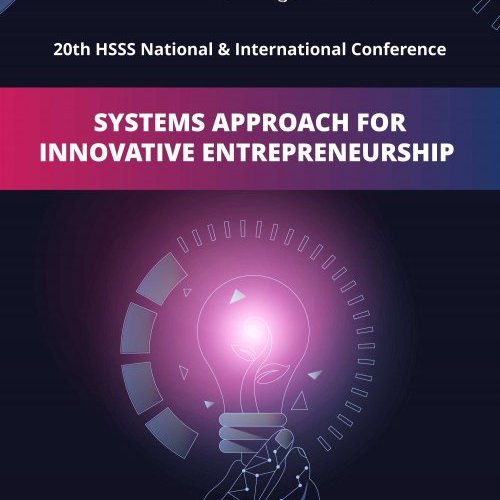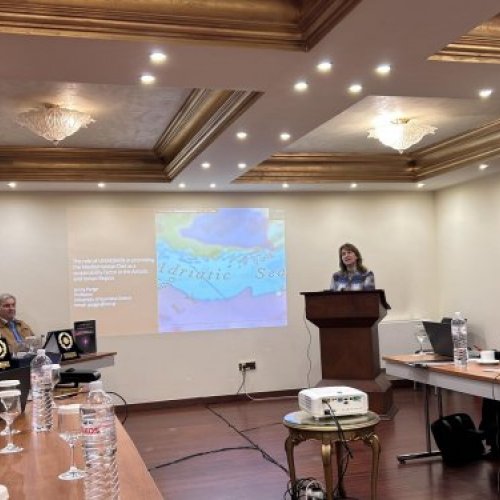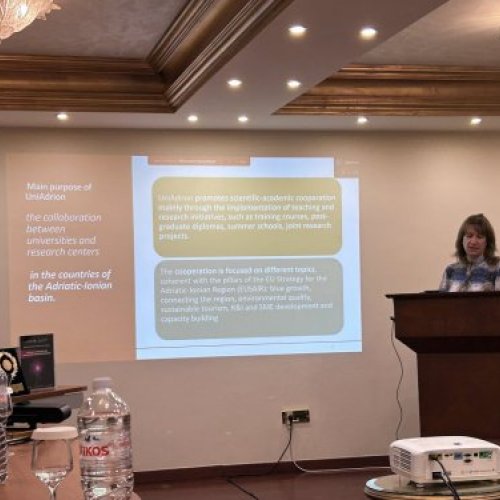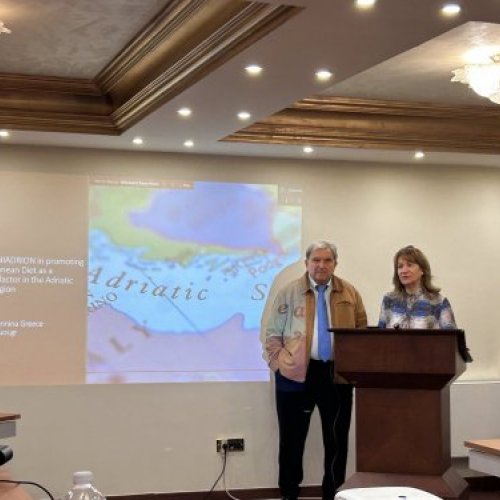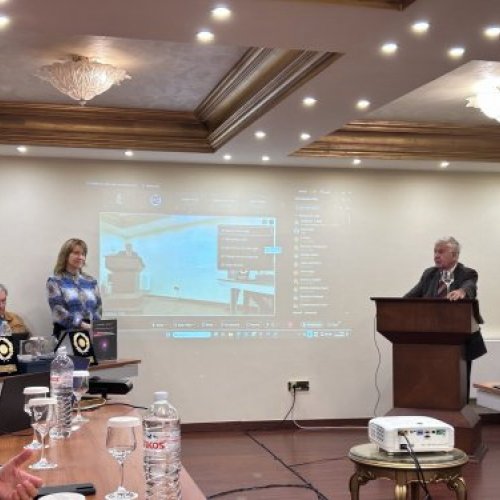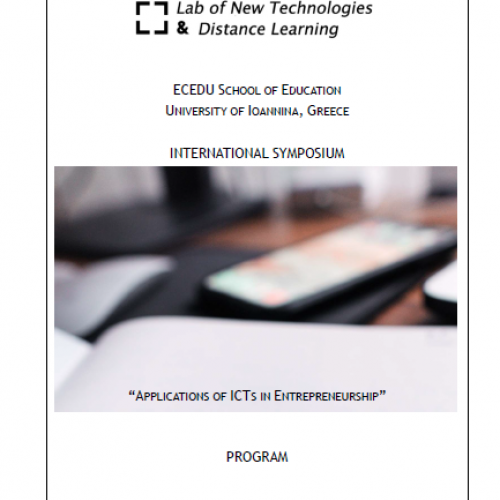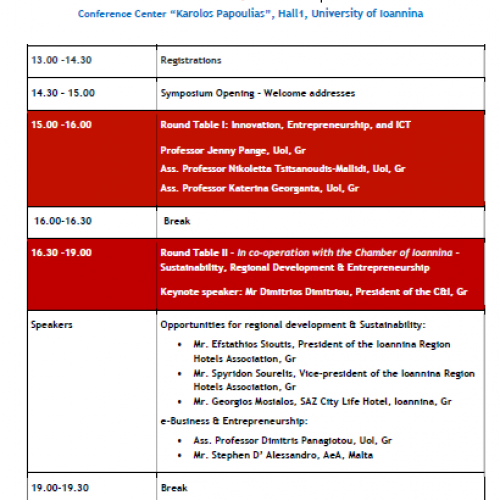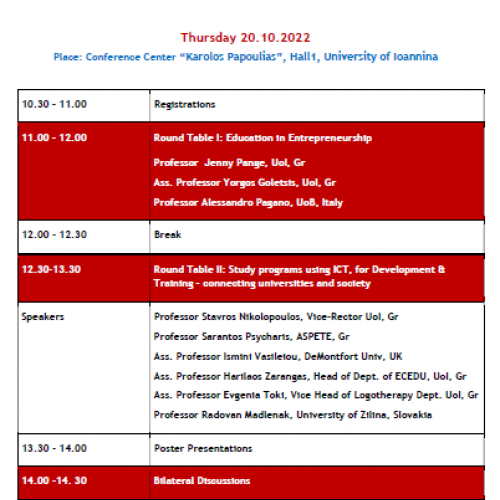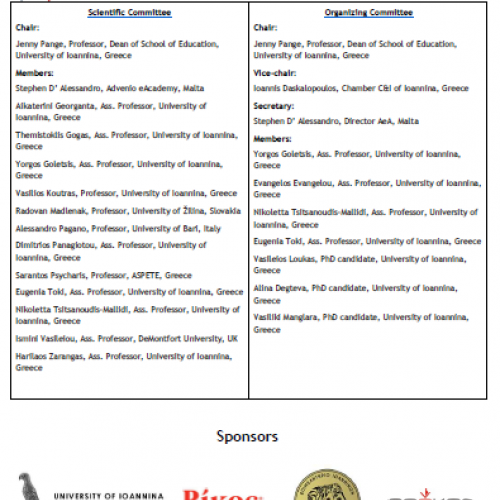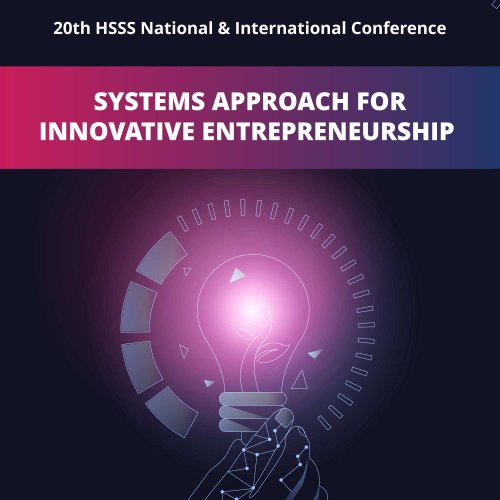
20ο Εθνικό & Διεθνές Συνέδριο Καινοτόμου Επιχειρηματικότητας
Το Εργαστήριο συμμετέχει στο 20ο Εθνικό & Διεθνές Συνέδριο Καινοτόμου Επιχειρηματικότητας, το οποίο θα πραγματοποιηθεί από τις 11 έως τις 14 Δεκεμβρίου στα Ιωάννινα.
Το συνέδριο διοργανώνεται σε συνεργασία με την Ελληνική Εταιρεία Συστημικών Μελετών (ΕΕΣΜ) και το Πανεπιστήμιο Ιωαννίνων, μέσω του Εργαστηρίου Νέων Τεχνολογιών & Συστημάτων Εξ Αποστάσεως Εκπαίδευσης.
Ημερομηνία: από 11 έως 14 Δεκεμβρίου 2024
Link Συνδερίου: https://confe.hsss.eu
Σχετικά Έγγραφα

Συνέδριο για τις Διεθνείς Δράσεις και Συνεργασίες του Πανεπιστημίου Ιωαννίνων
την Τρίτη 7 Ιουνίου 2022, από τις 9:30 έως τις 17:15, το οποίο θα πραγματοποιηθεί υβριδικά στην Αίθουσα Τελετών “Γεώργιος Μυλωνάς”, στην Πανεπιστημιούπολη Ιωαννίνων.
Μπορείτε να παρακολουθήσετε σε απευθείας μετάδοση το Συνέδριο στον ακόλουθο σύνδεσμο: https://diavlos.grnet.gr/event/e4034 την προγραμματισμένη ημέρα και ώρα.
Μπορείτε να δείτε το πρόγραμμα του Συνεδρίου στο συνημμένο αρχείο.
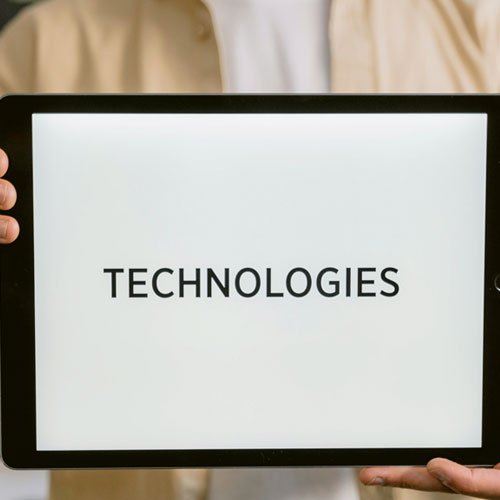
Special Issue "Digital Technologies and Digital Transformation: Recent Progress and Present Challenges"
https://www.mdpi.com/journal/sustainability/special_issues/digital_technologies_transformation
Message from the guest editors:
To do things that go beyond current needs and requirements: that’s what success means in today’s world. In a couple of years, it might be too late. Addressing new topics, tasks, talents, and their development requires courage, patience, a clear vision, and trust.
Current trends in digital transformation are based on technologies that have a major impact on customers’ behavior and on the ways that business transformation is conducted. In the 1990s, digital products and services were used only by the companies that were operating in selected industries such as music and entertainment and the development and sales of electronics. Digital infrastructure and digital products providers have laid the foundation for improving efficiency and productivity across multiple functional units of businesses, from finance to supply chain and human resource management. The turn of the millennium brought new services of electronic business and electronic commerce. The increasing use of the internet caused the increase in consumer demand for new digital products and services. Wide access to information and the opportunity to be online have led to a transformation of all sectors. Digital transformation applies to all businesses and sectors—what customers or consumers easily use in one sector also demand from another. Therefore, increased orientation of companies and organizations towards consumers and users is the result of the digital transformation.
A number of existing and new digital technologies play and will play a key role in the transformation of businesses and entire sectors of the national economy. The nature of some jobs is changing. This change will certainly continue in the future. New jobs will be created and therefore, in addition to employment developments, necessary skill levels to work with digital technologies need to be examined. Digital transformation also applies to products. In many cases, these products are provided free of charge and their value is not included in official statistics of measuring economic performance.
Finding the answer to a number of questions is the challenge for today. How can the potential of digital technologies affecting the economic subjects be explored? What methodological approach needs to be applied in order to explore the potential of the digital economy? What do the digital products have in common? What is their value? How is business productivity and performance changing? How are countries' GDPs changing as a result of digital transformation and the mass use of digital technologies? How to capture the impact of digital products, which are provided free of charge and which benefit people, in official measurements of indicators associated with the determination of the performance of national economies?
In order to address the present challenges and questions, we welcome studies, research results, and case studies as well as methodological papers that provide diverse approaches, experiences, and perspectives on the application of digital technologies and digital transformation processes in different geographical areas, sectors of the economy, and activities or processes.
Guest Editors:
Prof. Tatiana Čorejová
Prof. Ing. Radovan Madleňák
Prof. Jenny (Pagge) Pange
Deadline for manuscript submissions: 31 December 2021
Σχετικά Έγγραφα

Special Issue "ICT and Statistics in Education"
https://www.mdpi.com/journal/applsci/special_issues/ict_stat
Message from the Guest Editors:
The idea behind publishing this Special Issue is not to predict the future of using ICTs for statistics education but to foresee the great potential of using ICTs and statistics within authentic educational environments. The changes that entail the transition from teaching through ICTs to sustainable educational applications using ICTs is o+en followed by the strength in adopting them. The unprecedented public health crisis with the COVID-19 pandemic shapes education around online learning environments and cooperative discovery-based understandings of new concepts in unpredictable situations. Furthermore, it is the first time where data and statistical analysis are playing such an important role in education and the economy. The importance of teaching statistics and data analysis is where we should focus on. But, first, we need to start with rich educational scenarios on teaching statistics in all educational levels. Classroom studies, case studies, and teaching practices involving ICTs in education and teaching statistics are welcome. The planned Special Issue aims to explore this field.
Guest Editors:
Prof. Dr. Jenny Pange Lab of NT and Distance Learning, School of Education, University of Ioannina, Ioannina, Greece jpagge@cc.uoi.gr
Dr. Zoi Nikiforidou Early Childhood, Faculty of Education, Liverpool Hope University, Liverpool, UK nikifoz@hope.ac.uk
Deadline for manuscript submissions: 10 August 2021

Συνέδρια-Συμπόσια-Ημερίδες
- Συνέδριο με θέμα "Τεχνολογία και Πολιτισμός στην εποχή της Παγκοσμιοποίησης", Ιωάννινα, 2004.
- Διεθνές συμπόσιο "Lifelong Learning Accreditation of Prior Experiential Learning / Current issues in Greece", Αθήνα, 2006.
- Ημερίδα για τη Δια Βίου Εκπαίδευση με θέμα "Αναγνώριση Προηγούμενης Εμπειρικής Γνώσης στην Ελλάδα", Ιωάννινα, 2006.
- Συνέδριο σε συνεργασία με την ΕΕ Συστημικών Μελετών, Επιστημονικό Συνέδριο της HSSS "Συστήματα διαχείρισης Πληροφοριών", Ιωάννινα, 2008.
- Συνέδριο "Διασυνοριακή Αρχιτεκτονική Κληρονομιά, Ιστορική και Πολιτιστική Κληρονομιά", Ιωάννινα, 2008.
- Σεμινάριο με θέμα "Ανάλυση Δεδομένων", Ιωάννινα, 2009.
- Επιστημονική ημερίδα με θέμα "Μουσική έκφραση και δημιουργία", Πρέβεζα, 2012
- Συμμετοχή σε ημερίδα με θέμα "Ανοικτά Ακαδημαϊκά Μαθήματα στο ΤΕΙ Ηπείρου", Ιωάννινα, 2015
- Συμμετοχή σε πανελλήνιο συνέδριο με θέμα "Ψηφιακό Εκπαιδευτικό Υλικό και Ηλεκτρονική Μάθηση 2.0", Κόρινθος, 2016. Συνεδρία με τίτλο "COMMIT project: Δέσμευση στον κοινωνικό προσανατολισμό των Πανεπιστημίων στην Ευρώπη και η χρήση ΤΠΕ", Αίθουσα 3, στις 27/3/2016 Κόρινθος.
- Συμμετοχή σε ημερίδα με θέμα "Ανάπτυξη Συνεργατικού Μεταπτυχιακού στην Επιχειρηματικότητα με πολλαπλά Ακαδημαϊκά Ιδρύματα (MHEI-ME)", Ιωάννινα, 2018.
- Το Εργαστήριο ΝΤ και Εκπαίδευσης από Απόσταση συμμετείχε ενεργά στην τεχνική υποστήριξη του συνεδρίου "Contribution of Women Entrepreneurship to the Development of Alternative Tourism", Άρτα, 2019.
- Συνέδριο με τίτλο "Χρηματοδότηση και Ανάπτυξη του Τρίτου Τομέα της Οικονομίας", Άρτα, 2020.
- Συμμετοχή στο "AII-FORA online Side-Event “COVID-19 pandemic – imposed catalyst for Women’s Entrepreneurship progress in the Adriatic and Ionian Region?” 29th January 2021" EUSAIR FORUM, 2021
- Διοργάνωση INTERNATIONAL SYMPOSIUM IOANNINA 19-20/10/2022, " Applications of ICTs in Entrepreneurship"
- Summer seminar 2024, Ioannina, www.aiinteachingandlearning.
org

